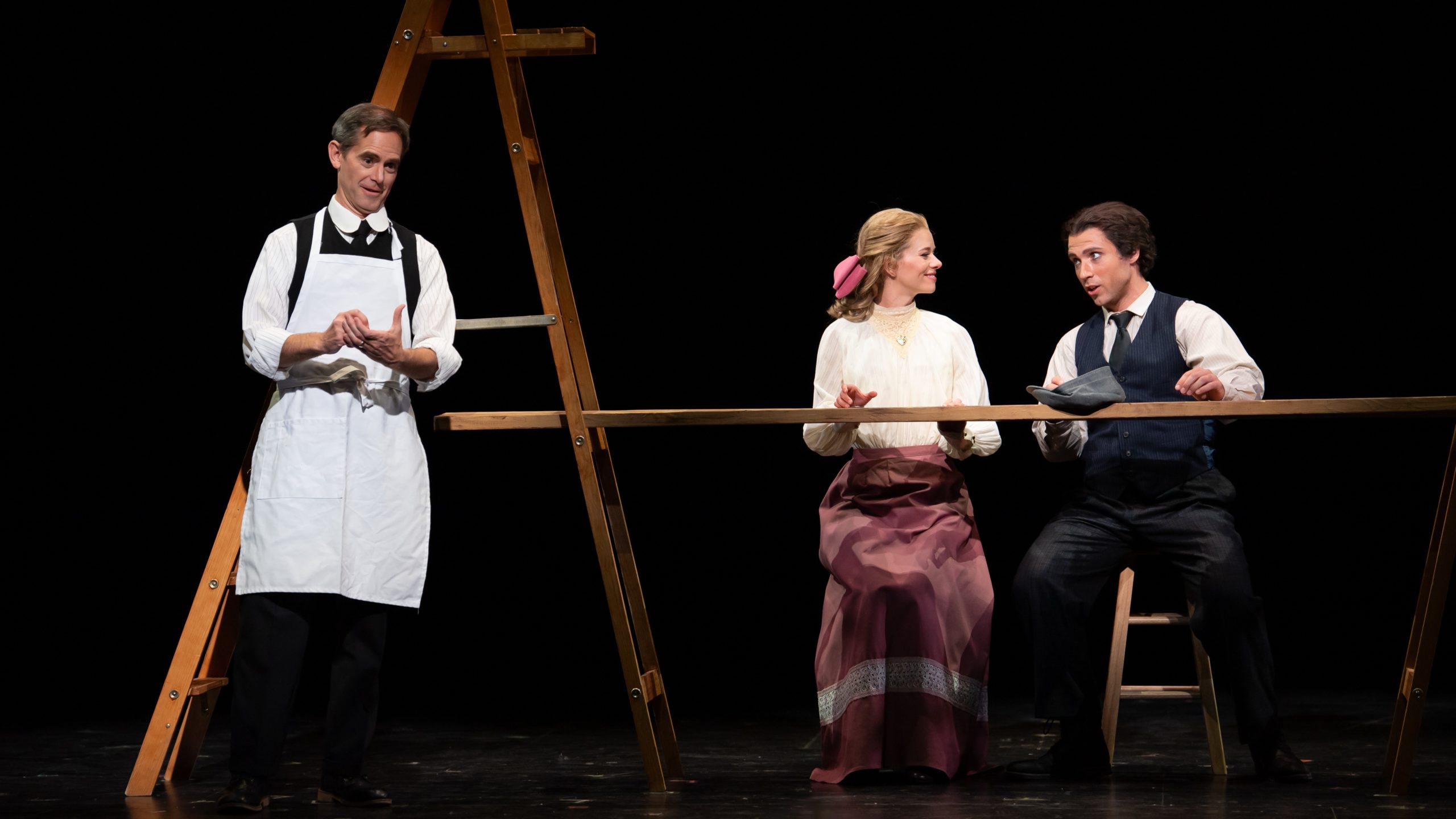LOGAN — The Utah Festival Opera & Musical Theatre presents the Utah premiere of Our Town, a three-act opera by composer Ned Rorem and librettist J. D. McClatchy adapted from the original 1938 play of the same name by Thornton Wilder. Directed by Vanessa Ballam with the orchestra conductor Andreas Mitisek, the production presents the same themes and vignettes of the play, all centered around the inhabitants of Grover’s Corners, New Hampshire, from 1901 to 1913. Those familiar with the play will recognize the same elements and the essence of the original production with the absence of spoken dialogue.
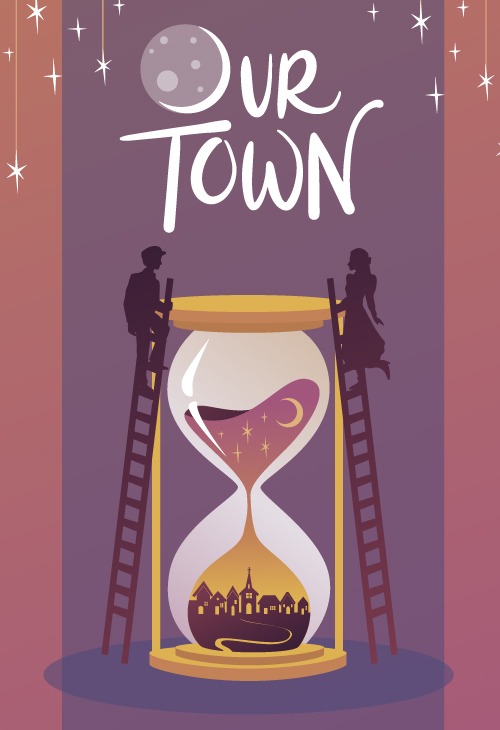
Our Town works as both a play and an opera because of the theatrical way in which the events of life, marriage, existence, family, and death are presented. The Stage Manager (played by Thomas Glenn) directly addresses the audience throughout the play. In this role, Glenn is tasked with presenting the town of Grover’s Corners and connecting the audience to the various characters and vignettes of their lives. Glenn performed with great charm and charisma, giving an engaging performance with a clear singing tone. Glenn’s presence on the stage was particularly effective as the role of the Stage Manager asks the performer to mainly interact with the audience rather than scene partners. This is especially true during the first act, in which much exposition is given about the town and its inhabitants almost like a documentary in the medium of opera.
The main plot structure of the opera surrounds the relationship between two families and their children, Emily Webb (played by Amy Owens) and George Gibbs (played by Victor Starsky). As the Stage Manager introduces Emily and George, the audience watches these characters grow together and eventually marry. At first, Owens and Starsky delivered an uneasy chemistry between their characters that felt unlikely to progress further. Considering that their first introduction is as school children, it works to allow their relationship to grow throughout the first and second acts of the show. When the audience is presented with a flashback by the Stage Manager to view the moment that George and Emily recognized their love, Owens and Starsky gave compelling and convincing performances that their characters do belong together.
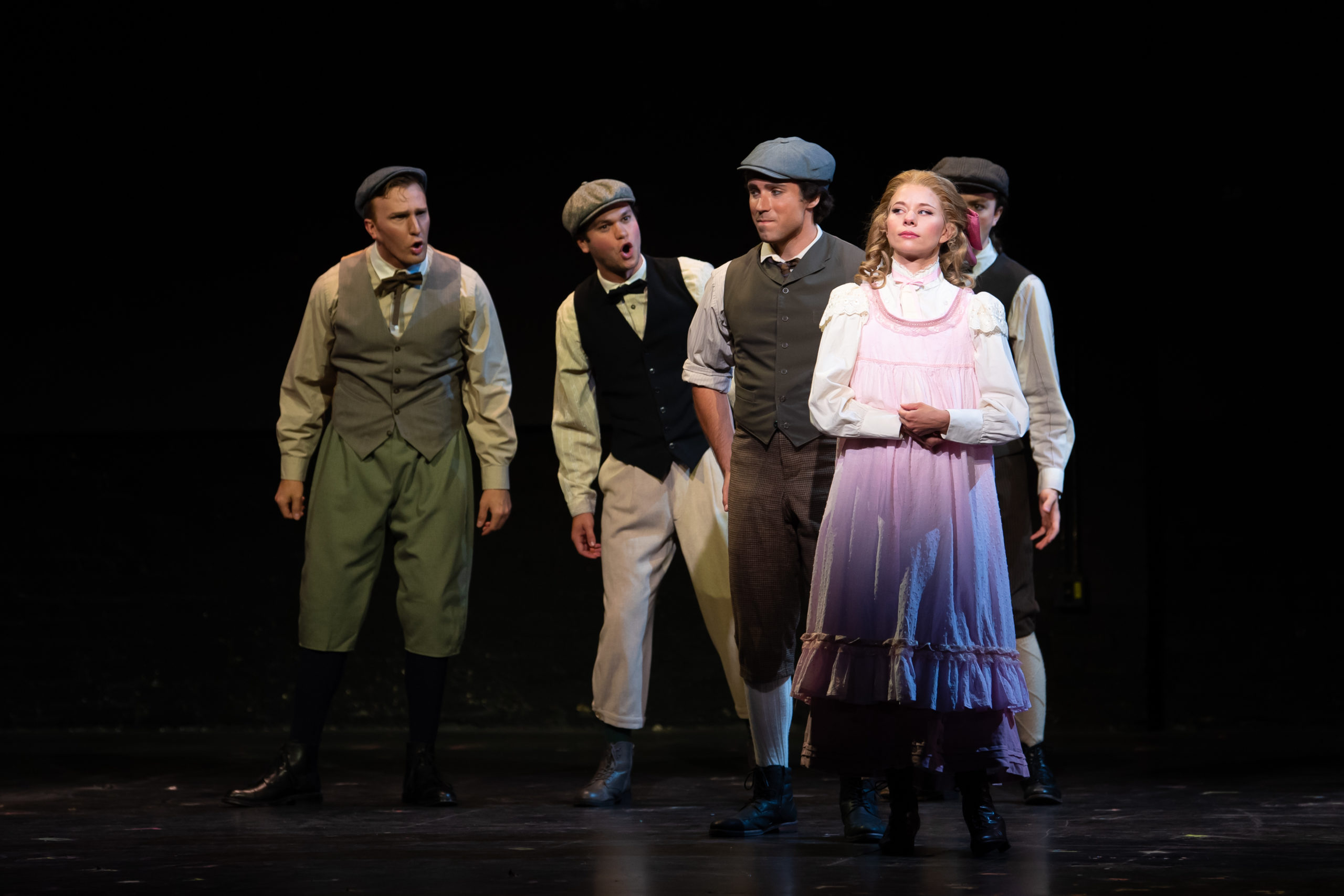
Bringing the style of opera to discuss matters so mundane as whooping cough, baseball, algebra problems, and string beans is the delightful juxtaposition of adapting the original work. Our Town as a play is meant to help reveal how life is extraordinary — if only the living can recognize it. Giving such ordinary activities a grandiose presentation adds a level of beauty that only an opera libretto can do in adaptation. The accessibility and normality of the events of the production sung with such extravagant presentation allow the audience even more time to ponder what such wonder life offers when time is allowed to give such mindfulness. All the singing performances are marvelous and add that musical sense of beauty to everything they sing about. One fascinating moment occurred when the group of George’s friends upset with George’s neglect of the baseball game due to a growing attachment to Emily. These friends sang in overlapping phrases that were loud and harsh but fit their role in the scene as hecklers to a budding romance.
The nature of the adaptation of the script into an opera means that the performance is sung-through in English with no spoken dialogue. To assist audience members, supertitles are present above the stage captioning the performance. These supertitles are an enormous aid in understanding all the phrases sung in operatic style. However, they often give away the punchline of jokes. Additionally, from sitting in the orchestra, it is difficult to read the supertitles above and watch the performers on the stage simultaneously. It is unfortunate, because the performers of the show are as engaging to watch as their singing voices are heard.
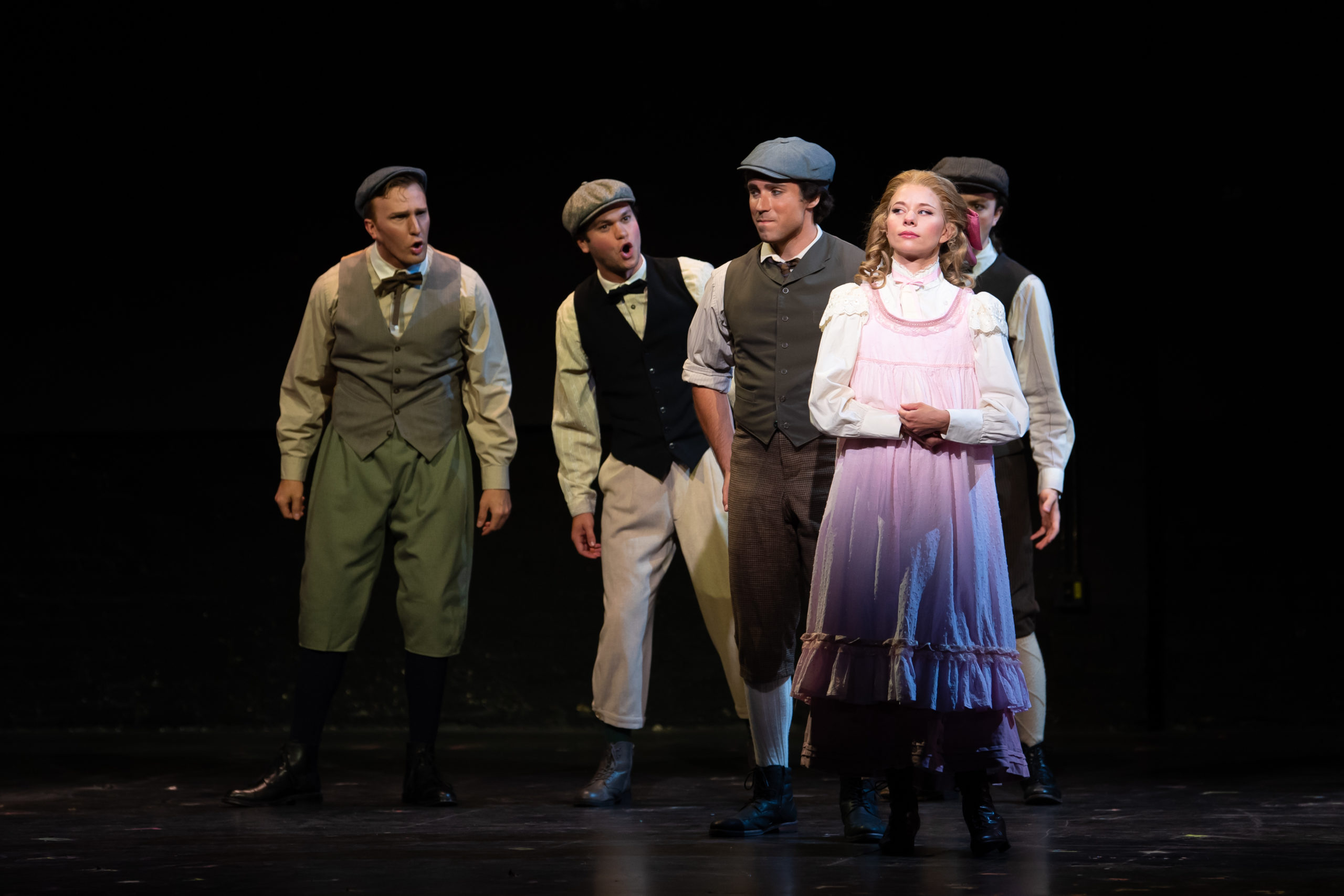
Limited scenic design is intentional to the original work, and something set designer Alexander Graham presents locations in an abstract manner. The set includes wooden ladders, two tables, and chairs. Likewise, there are limited props, which means most of the performances are mimed effectively to convey the object being handled. These limited aspects draw more attention to the costumes designed by Meredith Magoun, which marvelously convey time and place through era-appropriate clothing. Emily and George have a juvenile look in the first act, but they get a more mature appearance for the second act of the show matching the other adults. This costume change is beautifully done as a moment of transition between the first and second acts of the show. A later scene offers the perspective of the dead and in passing on: the performers are dressed in muted gray tones in contrast to their brighter costumes from the previous acts of the show. It is an element that adds to the over message centered on appreciating the gifts of life.
The directing of this final act at the cemetery is very effective. Ballam stages the dead of Grover’s Corners sitting stoically to the side with an empty chair waiting. The living residents enter in mourners’ black, carrying black umbrellas. These umbrellas are one of the only props in the show and are used to effectively add layers and dimension to the crowd of people gathering. Everything speaks to the sorrow of endings and the misery of those passed on. Lighting designer John Mitchell uses hanging lightbulbs that appear as hovering globes of light twinkling over both the living and the dead present in this act. These lights are introduced briefly in the opening of the opera and return as a scenic element through the final act. The overall effect is elegant and beautiful, aiding in providing a time and space-suspending aura.
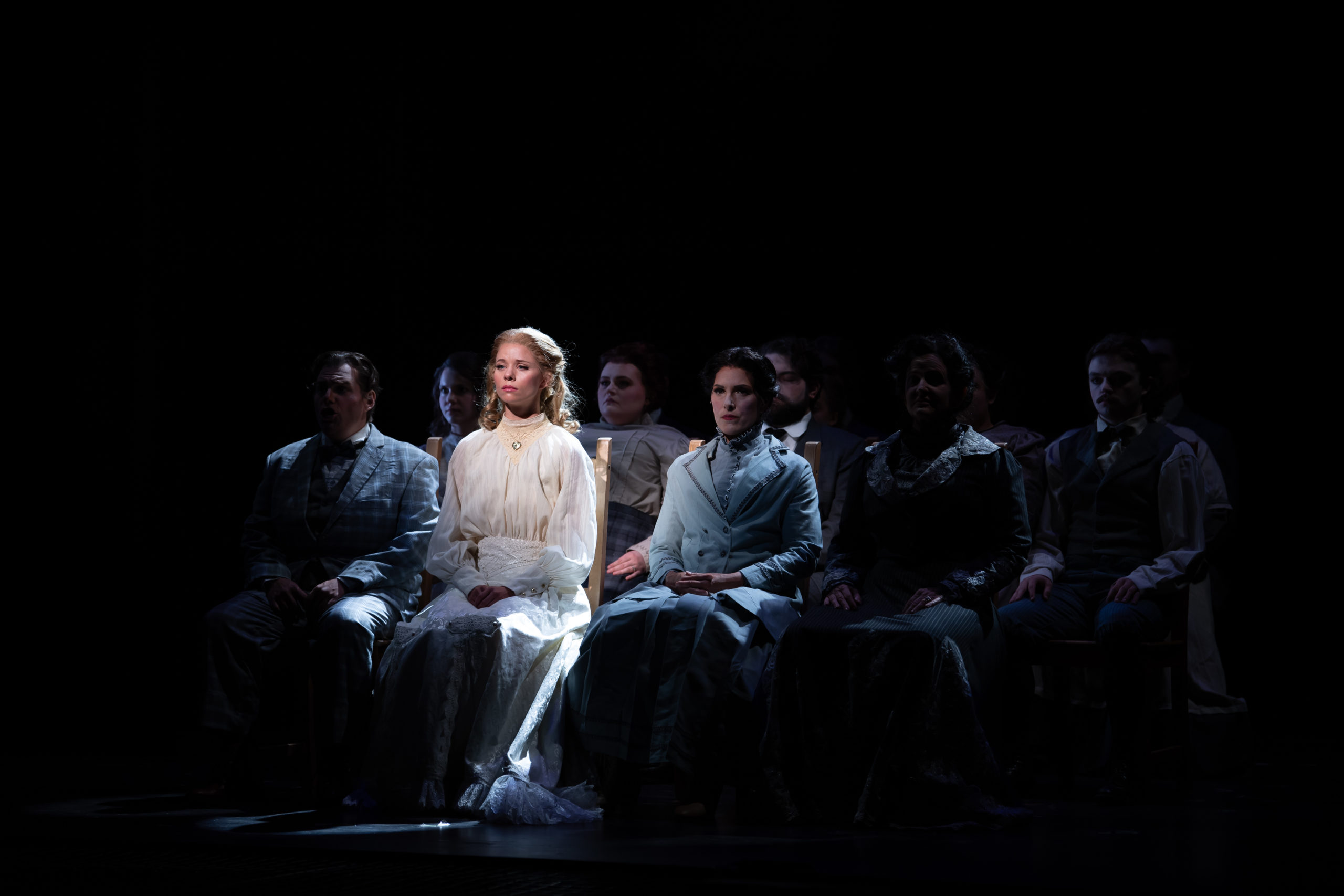
Our Town as an opera takes the best elements of the play by Thornton Wilder as asks the great poignant questions surrounding life itself. In bringing this production to Utah — a state where small towns and communities have always been important — there is a resonance that Grover’s Corners is a place many audience members will recognize. As the play unfolds and the characters are developed, the conclusion brings a sense of melancholy countered with a resolve to be more mindful and intentional in the beauty that life can offer. Compared to the remainder of modern entertainment that drives humanity to distraction and meaningless snippets of entertainment, Utah Festival Opera’s Our Town offers a significant contrast and deeply establishes what it means to be truly aware of life as we live it.
[box]The Utah Festival Opera and Musical Theatre production of Our Town plays various dates at 1 PM or 7:30 PM through August 3 at 7:30pm at the Ellen Eccles Theatre (43 South Main Street, Logan). Tickets are $23-89. For more information, visit utahfestival.org.[/box]

